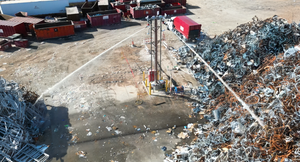Los Angeles' Franchise Zones are Aimed to Help the City Work Toward its Zero Waste Goals
Among the goals listed by the program are: reducing city landfill disposal by a million tons per year by 2025; setting transparent and predictable waste and recycling service rates; compliance with environmental mandates; reducing greenhouse gas and air pollution emissions; and decreasing food waste.
Last week, after a nearly two-year process, the Los Angeles Board of Public Works approved a $3.5 billion waste hauling contract, which will include 11 franchise zones split amongst seven waste haulers. By better serving the three million tons of waste disposed of yearly by the city’s businesses, consumers and residents, the goal is get Los Angeles one step closer to achieving its zero waste goals.
Once both City Council and Los Angeles Mayor Eric Garcetti, approve the contracts, Athens Services will manage waste in three zones, Republic Services two zones, Waste Management two zones, Universal Waste Systems one zone, NASA Services one zone, CalMet Services one zone and Ware Disposal one zone. The 10-year-long franchise rights are slated to take effect in July 2017.
The program was set in motion in April 2014, when the Mayor and City Council approved an ordinance allowing for the establishment of the exclusive franchise system. Medical waste and construction and demolition waste are exempted from the program. Public residential waste and recycling also are unaffected by the program.
Among the goals listed by the program are: reducing city landfill disposal by a million tons per year by 2025; setting transparent and predictable waste and recycling service rates; compliance with environmental mandates; reducing greenhouse gas and air pollution emissions; and decreasing food waste.
Additionally, says Department of Public Works Public Relations Specialist Jimmy Tokeshi, the franchising agreements should improve health and safety for solid waste workers, ensure long-term competition and improve service accountability and quality customer service.
For the first time, all the major sectors of residential, commercial and large multifamily buildings in the city will be recycling. Commercial customers will be impacted by the program.
“LA Sanitation (LASAN), in coordination with the Zero Waste LA franchise service providers, will develop detailed customer outreach, education and customer transition plans,” says Tokeshi. “These plans will help ensure a smooth customer transition into Zero Waste LA. Beginning in July 2017, the franchised service providers will begin performing waste assessments of each business, and begin performing customer outreach and education. Customers will be transitioned into Zero Waste LA when they receive the necessary training and they begin receiving the suite of services provided under Zero Waste LA.”
All customers will be transitioned into Zero Waste LA by January 2018.
Franchise haulers will have additional work to do to stay within their contracts, says Tokeshi. They will have detailed requirements for tonnage reports and tracking and be required to submit monthly tonnage reports, by waste stream, identifying the facility utilized. All facilities must be certified by the sanitation department, and as part the certification requirements, those facilities also will be required to submit monthly reports.
The city has said under the current open-market system, it is unable to regulate the business, push diversion targets or establish labor standards. L.A., which has reported a 76.4 percent diversion rate, has hopes the franchise zones will help the city meet zero waste goals including its 90 percent diversion goal.
But the cost, says Chaz Miller director of policy/advocacy for the National Waste & Recycling Association, Washington, D.C., is high for those haulers currently serving L.A.’s commercial customers.
“Franchising is an artificial system that operates outside the free market, and it artificially creates winners and losers. There clearly will be companies that operate in L.A. that will no longer be operating in Los Angeles, which undoubtedly will mean people will lose jobs, because you either get a franchise or you don’t.”
It is difficult, Miller says, to take a free-market system that has worked very efficiently and transform it into a district system.
“I think it is fair to say that New York is taking a look at this and realizing it is an extremely complicated undertaking,” he says. “The reality is it is hard to say how it will impact things nationally. Again, the issue is in L.A. you will see companies go out of business. If they didn’t get a franchise, they’re toast.”
Miller says other cities, like Chicago, have considered franchise zones and passed on the concept. LA may also find it a complicated transition as commercial hauling requires a much more customized collection service than residential waste does, he says.
“It’s really an experiment. It’s a year and a half to full implementation. I’m sure that there’s going to be many surprises in the next year and a half as they labor to implement this thing. And I suspect it’s fair to say that most businesses in L.A. will pay more money,” says Miller.
However, some say the payoff is worth it.
“Winning a waste franchise zone guarantees haulers 10 years of business in the very lucrative LA market, thus providing them with an incentive to deploy less polluting trash trucks, end dependence on landfills, and develop good jobs in the state-of-the-art green infrastructure needed to sort and process new waste streams,” says Linda Escalante, environmental policy advocate for the Natural Resources Defense Council, who has urged the city to move forward in its approval of the program.
“But in order for Los Angeles to fulfill its potential as national leader in clean and sustainable waste collection, Zero Waste LA needs to start without delay,” she says.
Solid Waste Association of North America (SWANA) CEO and Executive Director David Biderman says the Los Angeles program was discussed at the initial meeting of the New York City Department of Sanitation’s (DSNY) Advisory Board on franchising on Sept 29. The franchise awards, he says, mark an important milestone on the lengthy journey that LA has embarked on, as it transitions to zoned collection.
“In New York, the City is at the beginning of a similar journey, and Commissioner Garcia and her team are smartly bringing the stakeholders together to ensure that whatever system results works well for all New Yorkers,” he says. “SWANA is pleased to be part of this process and provide its nationwide expertise and perspective to DSNY.”
About the Author
You May Also Like


.png?width=300&auto=webp&quality=80&disable=upscale)